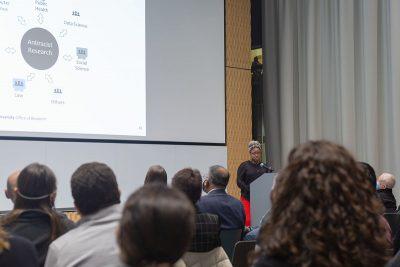Data science can be applied to various disciplines and catalyze social change. Boston University’s Office of Research hosted “Research on Tap: Data Science for Racial Equity,” Tuesday examining how data science can be used to promote racial equity.

The event emphasized the urgent need for research that “exposes racist policy implications” and informs the public and policymakers on antiracist alternatives.
“Data science can be the window through which we can see racism, by helping us to understand historical patterns and uncover racial inequity,” the event description said.
Brooke Williams, an event presenter and associate professor of the practice of computational journalism in the College of Communication, added that data collection is important in assessing inequity in race and policy.
“In many cases, the government’s data is flawed,” Williams said in an interview. “In some cases, we just simply don’t know. We couldn’t assess if there has been inequity in race and policy because we simply haven’t collected the data.”
Data scientists need to start collecting data more accurately to better represent racial inequities, Williams said.
“It’s not just what we collect, it’s how we collect it,” she said.
Williams said that data forces legislators and lawmakers to recognize problems by confronting them with the facts. It also allows journalists to “speak about the problem with authority,” she said.
“Data is a backbone of a story because we aren’t relying [on] what people say,” she said. “Those stories always have a greater impact on making change.”
Director of BU Spark! Ziba Cranmer said in an interview that media reception is critical in “changing the conversation and giving policymakers something to respond to.”
“Our role is to uncover injustice and inequities and to create an environment where policymakers are compelled to act because the truth has been revealed,” Cranmer said. “It creates accountability for policymakers and to follow through on day one around racial and social justice.”
Audience member Elizabeth Nelson, a senior in the College of Arts and Sciences, said the event was “enlightening.”
“It’s pretty interesting to see how they’re using research and data to work towards public health, which doesn’t normally get as much of the research and data science aspects included,” she said in an interview.
Elaine Nsoesie, assistant professor in the School of Public Health and presenter at the event, spoke about a racial data tracker from the Center for Antiracist Research, which can be used to catalog who is collecting the data and what and how it is reported.
Tools like the racial data tracker can quantify the impacts of structural racism and racial inequities and be used to demand and create change, Nsoesie said.
BU’s Justice Media co-Lab is combining the power of journalism and data to support high-quality, justice-oriented reporting. The lab is born out of a collaboration between COM and the new Computing and Data Sciences faculty.
“The skills of data science and computing are really important to making a case in making visible injustice and disparities,” Cranmer said. “We wanted to bring those two pieces together.”
Williams described this collaboration as a “dream come true.”
“Having data science students in the room gives a whole new life to these investigation laboratories,” she said.
Williams said the team is collaborating to create an “algorithm that will alert editors and reporters of potential racism in news stories.”
Cranmer said that an impactful news story taps into both data and storytelling.
“You have to touch the heart and the head,” Cranmer said. “The head is the data and the heart is the bringing to life through the story of human impact.”



























































































































zortilonrel • Dec 11, 2021 at 2:32 pm
Some truly nice stuff on this site, I like it.